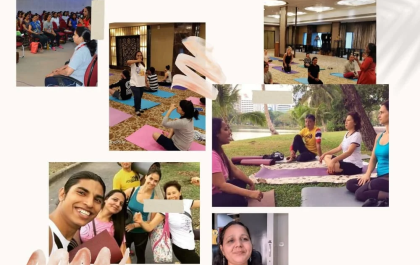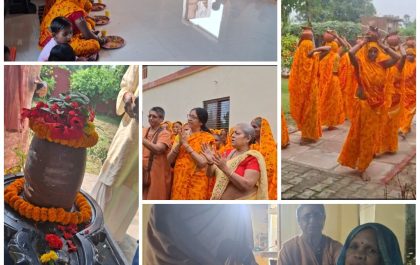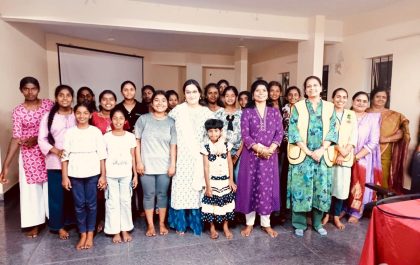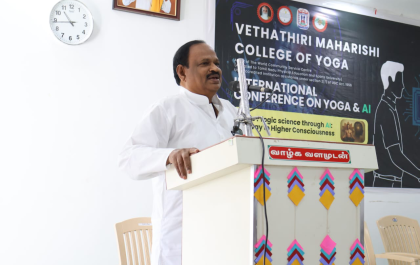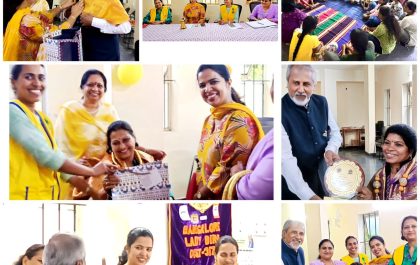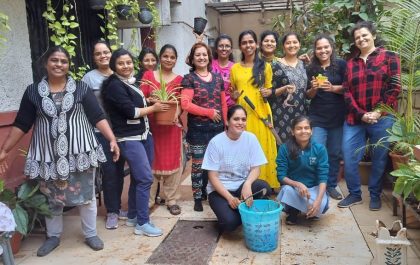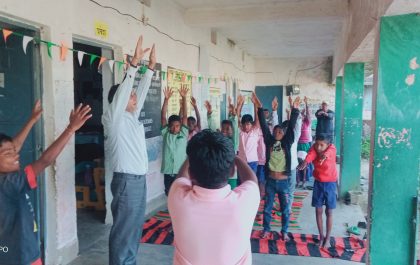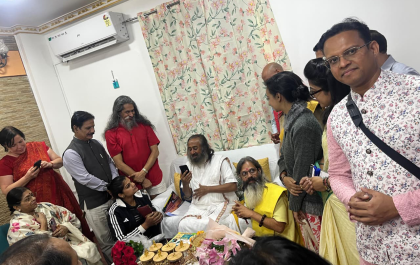School of Yoga Therapy, ISCM (an Associate Centre of Indian Yoga Association), Puducherry organised an eight-day International Faculty Development Programme (FDP) under the Signature Event category of Yoga Bandhan, held from 14 May to 6 June 2025. This intellectually stimulating series brought together eminent thought leaders and yoga practitioners from India and abroad to explore how ancient yogic wisdom can meaningfully contribute to the achievement of the United Nations Sustainable Development Goals (SDGs).
The event commenced with Sri Krishna Prakash, Founder of Shrimath Yoga, who spoke on the “Role of Pratyahara in Achieving SDGs.” He emphasized inner awareness and self-regulation as vital foundations for sustainable progress, highlighting how yogic practices like antar mouna (inner silence) can foster clarity and ethical decision-making.
Prof. Ingunn Hagen from the Department of Psychology, NTNU, Norway, delivered the second session, focusing on climate action, responsible consumption, and well-being. She discussed how yogic values like ahimsa and aparigraha align with global sustainability efforts, urging yogis to take active responsibility for environmental stewardship and youth engagement.
Dr. Karri Rama Reddy, a leading psychiatrist, presented a session on “Yoga and Positive Psychology,” explaining how yogic disciplines such as yama, niyama, and salutogenesis contribute to human flourishing and holistic mental health. He made a strong case for integrating yogic practices into public health and psychological interventions.
Dr. Malini Nath, representing Gitananda Yoga, Australia, offered an ecologically grounded perspective with her topic “Interconnectedness: Yoga and Ecology.” She articulated how disconnection from nature has led to ecological crises, and how daily yogic practices can restore balance, compassion, and sustainable habits that align with planetary healing.
Dr. Mathimaran Natarajan from Pondicherry University expanded on the One Health approach in his session on “Sustainable Living and Planetary Health.” He linked yogic lifestyle, environmental consciousness, and interdisciplinary collaboration as keys to combating pressing global challenges like pollution, biodiversity loss, and climate change.
Dr. Kalpana Sharma, Director at Amity School of Physical Education & Sports Sciences, discussed the role of Yoga in education. Her session focused on integrating Yoga into school and university curricula, as promoted by the National Education Policy (NEP) 2020. She emphasized that yoga enhances mindfulness, emotional resilience, and environmental awareness among students—critical skills for the next generation of global citizens.
The seventh day featured Dr. Susheel K Sharma from S-VYASA Bengaluru, who spoke on cardiovascular health. His session outlined an integrative therapeutic approach combining yoga with modern medicine to prevent and manage heart diseases. He presented scientific evidence on how pranayama and lifestyle changes can reduce risk factors like hypertension and improve arterial health.
The series concluded with Dr. Pooja More from NIMHANS, Bengaluru, who delivered a comprehensive session titled “Yoga for Achieving United Nations Sustainable Development Goals (UN SDGs).” She presented a study connecting each of the 17 SDGs with corresponding yogic practices and philosophies, making a compelling case for using yoga as an eco-therapeutic and transformative tool for sustainable development.
This International FDP not only deepened understanding of the philosophical and scientific basis of yoga but also served as a powerful reminder of yoga’s potential to transform individuals and societies in alignment with global goals. Through this initiative, participants were inspired to become conscious agents of change—spreading wellness, sustainability, and harmony at all levels of existence.
